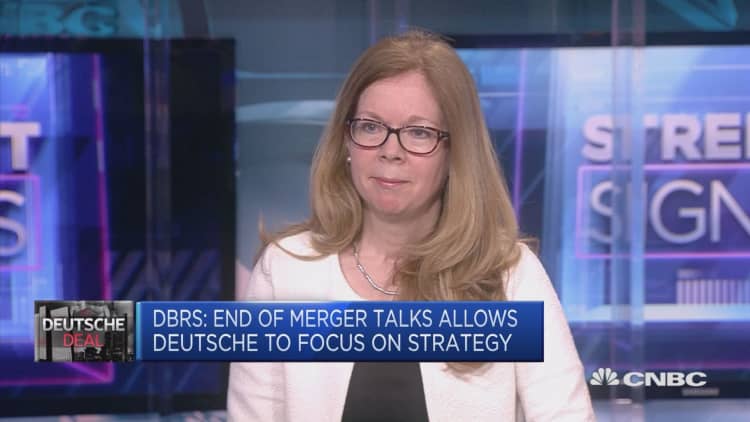Deutsche Bank reported stronger-than-anticipated first-quarter net profit on Friday, less than 24 hours after abandoning merger talks with Commerzbank.
Germany's flagship lender posted 201 million euros ($223 million) in net income for the first three months of the year. This was a rise of 67% from the same period a year ago and better than the 29 million euro figure given by Reuters in an analyst poll.
Revenues for the quarter were down 9%, with the bank's full-year target cut to "essentially flat" from 2018. Last month, Deutsche Bank had projected a slight increase in 2019 revenues.
Shares of the lender slipped 3% on the news.
"Our first-quarter results demonstrate the strength of our franchise and our continued progress in executing our plans in a very challenging market environment," CEO Christian Sewing said in statement.
"We have made progress on key business drivers: growth in loans and deposits, a recovery in assets under management and market share improvements in corporate finance."

Decision supported by the German government
Deutsche Bank had pre-released some of its expected first-quarter earnings on Thursday morning.
The detailed figures published Friday come shortly after Deutsche Bank and Commerzbank formally ended merger talks, saying the deal would have been too risky.
"This is a decision that has to be respected by everybody," German Economy Minister, Peter Altmaier, told CNBC's Eunice Yoon in Beijing, China on Friday.
"The fact that both banks agreed that such a merger is not the right thing to do means that is accepted and supported by the German government," Altmaier said.
Its common equity tier-1 ratio, which indicates a bank's strength, stood at 13.7% at the end of the first quarter.
In the past few years, Deutsche Bank has made headlines for all the wrong reasons — from settlements with the U.S. Department of Justice, to management reshuffles, weak earnings, constant restructuring and steep stock price falls.


